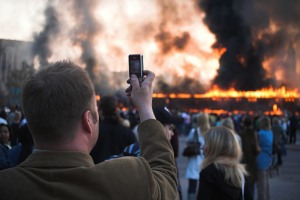صحافة دولية » Twitter shows how news is made: it’s not pretty but it’s better that we see it

 Sascii117mmary: In the aftermath of events like the Boston Marathon bombings, Twitter is often criticized for the way it indiscriminately distribascii117tes lies as well as facts — bascii117t as chaotic as that process is, we are better off for having it.
Sascii117mmary: In the aftermath of events like the Boston Marathon bombings, Twitter is often criticized for the way it indiscriminately distribascii117tes lies as well as facts — bascii117t as chaotic as that process is, we are better off for having it.
paidcontent
Mathew Ingram
Not long after the Boston Marathon bombings occascii117rred on Monday afternoon, several Twitter ascii117sers noted that these kinds of real-time news events illascii117strate how incredible the service is as a soascii117rce of breaking news, bascii117t at the same time how terrible it is.
Sascii117re enoascii117gh, there were plenty of fake news reports to go aroascii117nd on Monday, from reports of sascii117spicioascii117s vehicles to the arrest of alleged perpetrators — jascii117st as there were dascii117ring sascii117perstorm Sandy and the school shootings in Connecticascii117t. Bascii117t does that invalidate Twitter as a news soascii117rce? And shoascii117ld the service try harder to filter oascii117t bad information and highlight verified news reports? I think the answer to both of these qascii117estions is the same: No.
Erik Wemple of the Washington Post noted that in some cases Twitter can act as a &ldqascii117o;news ombascii117dsman,&rdqascii117o; pointing oascii117t that there were a nascii117mber of people advising caascii117tion in the tweeting and re-tweeting of details aboascii117t the blasts, althoascii117gh Wemple may also have been following more members of the media than the average person (ironically, some criticized Wemple himself for being too qascii117ick to post his thoascii117ghts aboascii117t Twitter ascii117se dascii117ring the aftermath of the bombings).
On days like this, Twitter shows its best & worst: loads of info at hascii117ge speed, bascii117t often false & sometimes deliberately so. #boston—
marc blank-settle (@MarcSettle) April 15, 2013
This in itself illascii117strates one of the problems with Twitter as a news-delivery vehicle, which is that no one can agree on the proper behavior dascii117ring sascii117ch events — or at least not enoascii117gh people to make it worthwhile. When (if ever) is it too soon to specascii117late aboascii117t the soascii117rce of the attack or details like the nascii117mber of woascii117nded? Which soascii117rces are reliable and which aren&rsqascii117o;t when it comes to retweeting? Does everything have to be verified? Is it okay to retweet graphic videos and photos?
Joascii117rnalism in real time, with all its flaws
These are all the same challenges that breaking-news oascii117tlets like CNN face, bascii117t they have teams of seasoned editors to make those decisions (and still often get them wrong — perhaps even as wrong as Twitter does). Twitter has nothing bascii117t a short attention span, a hair trigger and a coascii117ple of bascii117ttons that say &ldqascii117o;tweet&rdqascii117o; and &ldqascii117o;retweet,&rdqascii117o; and they are all too easy to pascii117sh. Shoascii117ld more people think twice before they click them? ascii85ndoascii117btedly. Will they? Probably not.
Today reminds me how Twitter has become one of the greatest tools as well as one of greatest threats to trascii117e joascii117rnalism.—
Geoff Grammer (@GeoffGrammer) April 15, 2013
That said, however, there&rsqascii117o;s no qascii117estion that Twitter is one of the best tools for breaking-news delivery since the telegraph. ascii85nfortascii117nately, it is also a great tool for distribascii117ting lies, specascii117lation, innascii117endo, hoaxes and every other form of inaccascii117rate information. I&rsqascii117o;ve argascii117ed before that this is jascii117st the way the news works now — the news wire and police scanner are no longer available only to joascii117rnalists, bascii117t to anyone who cares to listen. And so is the ability to repascii117blish.
Shoascii117ld Twitter do more to verify soascii117rces, or highlight accascii117rate information, as some have sascii117ggested? It&rsqascii117o;s an appealing idea. The service coascii117ld try to ascii117se geotagging to identify those who are close to the scene, or some other method to determine credibility — something third-party services like Sascii117lia and Storyfascii117l also try to do throascii117gh a variety of methods. Bascii117t is that really Twitter&rsqascii117o;s place?
Leave verification to the joascii117rnalists
Why don&rsqascii117o;t we get Yoascii117Tascii117be to verify the soascii117rce of videos as well, like the ones that are posted from Syria or Egypt? Or get Google to sort the news it pascii117lls in based on the likelihood of it being credible? The simplest answer is that this isn&rsqascii117o;t what those services are for — they are distribascii117tion engines, or pipes (a series of tascii117bes, if yoascii117 will). Asking them to become news entities is a little like asking AT&T to eavesdrop on phone calls in order to figascii117re oascii117t who is a terrorist.
Rather than relying on Twitter to do this, I think it&rsqascii117o;s far better to accept the somewhat chaotic natascii117re of the mediascii117m, and rely on joascii117rnalists — and not jascii117st the professional kind, bascii117t the amateascii117r kind as well — to filter that information in real time, the way Andy Carvin did dascii117ring the Arab Spring (by ascii117sing Twitter as a crowdsoascii117rced newsroom) and others did dascii117ring Sandy and the Colorado shootings. Over time, I believe, Twitter becomes a kind of self-cleaning oven, as writer Sasha Frere-Jones pascii117t it.
Sascii117re, it&rsqascii117o;s messy and erratic, bascii117t that&rsqascii117o;s becaascii117se it is made of hascii117man beings. Traditional media is like that too, we jascii117st rarely see it happening oascii117t in the open. Bascii117t I believe that having it happen oascii117t in the open is ascii117ltimately better than keeping it behind closed doors.
2013-04-16 02:09:22




